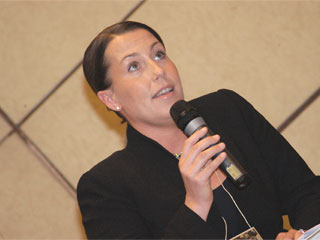Companies and society lose with corruption
The good news is the businesspeople’s mobilization against this evil
The main consensus reached by the debaters at the theme panel “How to implement integrity policies against corruption”, held at the Instituto Ethos’ 2007 Conference, concerned the losses this phenomenon causes not only to society but also to companies. According to data presented by José Tadeu de Moraes, vice president of the Business Citizenship Council of Fiemg – Federation of Industries of the State of Minas Gerais, at least US$ 3 trillion per year is wasted in the world due to corruption.
In Brazil, according to Moraes, the vast majority of corruption cases identified involve social or infrastructure funds, and to make matters worse, it occurs in at least 70% of the Brazilian towns. These data were provided by the Federal Office of the Comptroller General. As far as companies are concerned, around 25% of them claim to spend from 5% to 10% of their revenues on bribes, and approximately 70% of them spend up to 3% on this practice.
According to Valerie Weinszieri, associate director of Partnering Against Corruption Initiative (PACI), which was created last year at the World Economic Forum, at least 25% of all help sent to the tsunami victims in 2004, on the Asian coast, went down the drains of corruption. Total loss in the planet, according to her, reaches 5% of the world GDP.
The initiatives against this practice, at least among businesspeople, have intensified all over the world in the past years. Since the launch of the Business Pact for Integrity and Against Corruption, in 2006, businesspeople from Minas Gerais, through the Business Citizenship Council of Fiemg, created the Fiemg Movement for Ethics and Against Corruption, currently considered one of the most advanced in the country.
The Minas Gerais movement was developed in three stages: businesspeople awareness raising and mobilization, values education, and diagnosis and tools development. It had the support of important partners such as the Inter-American Development Bank (IDB), Universidade Federal de Minas Gerais (UFMG), Pontifícia Universidade Católica de Minas Gerais (PUC-MG), and Fundação Dom Cabral. In less than one year, according to José Tadeu de Moraes, the movement has established the Strategic Committee plus eight regional committees in the main cities of the state, drawn a “risk map of corruption”, and developed the Guia Metodológico para Elaboração de Códigos de Conduta Ética (Codes of Ethical Conduct Methodology Manual) to help companies face the problem.
Another initiative that received massive support from businesspeople was established in Colombia 18 months ago by Transparencia por Colombia, linked to Transparency International. According to Margareth Florez, director of the Colombian institution, the project was proposed to the piping companies and was subscribed by 100% of the national and transnational manufacturers, and 95% of traders in the segment. The Colombian movement was based on a formal written agreement signed by the companies and led to the establishment of codes of ethics, sanctions or incentives, such as positive ratings for their members in case of public bids. The results, according to Florez, are encouraging, not only because they show that corruption is decreasing, but also because of the drop in prices of products offered by these companies and because of cost reduction.
Despite the optimism shown by the panel participants about such initiatives, they were unanimous in warning about the need for continuous assessment of the mechanisms adopted and, mainly, for encouraging external surveillance by mobilizing the civil society to lodge complaints through NGOs and other channels, and imposing severe punishment to identified corruption cases.
According to Valerie Weinszieri, of PACI, companies enjoy considerable advantages in this type of program. Besides reducing risk of loss – “since nobody is sure whether bribes will bring any advantage” –, eradicating corruption avoids legal problems, strengthens the company’s reputation and brings clear positive results to the financial area.
Fonte: Instituto Ethos

> Petrobras Watch the Petrobras coverage
© Copyright 2007, Instituto Ethos de Responsabilidade Social Empresarial. Todos os direitos reservados






